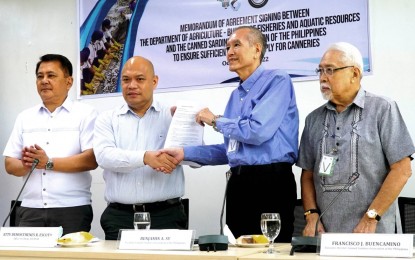 FISHERIES DEAL. Bureau of Fisheries and Aquatic Resources Officer-in-Charge Demosthenes Escoto (2nd from left) holds a signed memorandum of agreement with Canned Sardines Association of the Philippines president Benjamin Sy (2nd from right) on Monday (Oct. 24, 2022). The partnership between the government and the private sector aims to help fishers and maintain a sufficient supply of canned sardines in the market. (PNA photo by Ben Briones)
FISHERIES DEAL. Bureau of Fisheries and Aquatic Resources Officer-in-Charge Demosthenes Escoto (2nd from left) holds a signed memorandum of agreement with Canned Sardines Association of the Philippines president Benjamin Sy (2nd from right) on Monday (Oct. 24, 2022). The partnership between the government and the private sector aims to help fishers and maintain a sufficient supply of canned sardines in the market. (PNA photo by Ben Briones)
MANILA – The Bureau of Fisheries and Aquatic Resources (BFAR) signed Monday a memorandum of agreement (MOA) with the Canned Sardines Association of the Philippines (CSAP) to help local fishers and ensure a stable supply of canned sardines.
This came after BFAR’s consultation meeting with stakeholders, where several concerns were raised, including the looming canned sardines shortage.
At a press briefing, BFAR Officer-in-Charge Demosthenes Escoto said the MOA intends to provide free training to fisherfolk in the country’s municipal waters.
“Aside from sustaining, and ultimately increasing, the supply of sardines for canneries, the MOA intends to capacitate municipal fisherfolk on proper fish handling, food safety standards, and processing technologies,” he said.
The CSAP lauded the BFAR’s move to help fishers meet the standard catch for canned raw materials, especially during the closed fishing season.
“It will help uplift the livelihood of the local municipal fisherfolk where tamban is abundant. In addition, we are ensuring employment of thousands of factory workers in adjacent industries and the canneries can now operate during the three-month fishing ban,” CSAP president Benjamin Sy said.
“[The deal] will ensure that the supply of tamban to the canneries will be on a continuous basis and essentially ensuring the supply of canned sardines in the market,” he added.
The closed fishing season prohibits commercial fishing within specified areas for three months, starting in November.
Besides employment and sufficient supply for the upcoming season, Sy said the partnership between the government and private sector could help the country achieve the administration’s target of food security.
“We move towards food security and economic development for the good of our people… We are pleasantly surprised and impressed with the swift action and proactive outlook of the new leadership of the Bureau of Fisheries and Aquatic Resources,” he added.
The CSAP is expected to “observe fair trade” and strictly comply with purchase order terms and conditions.
The BFAR, meanwhile, will provide an identification registry of municipal fisherfolk associations, which shall be used as the CSAP’s reference.
The bureau, under the MOA, shall also secure support for logistics and the provision of post-harvest facilities. (PNA)
